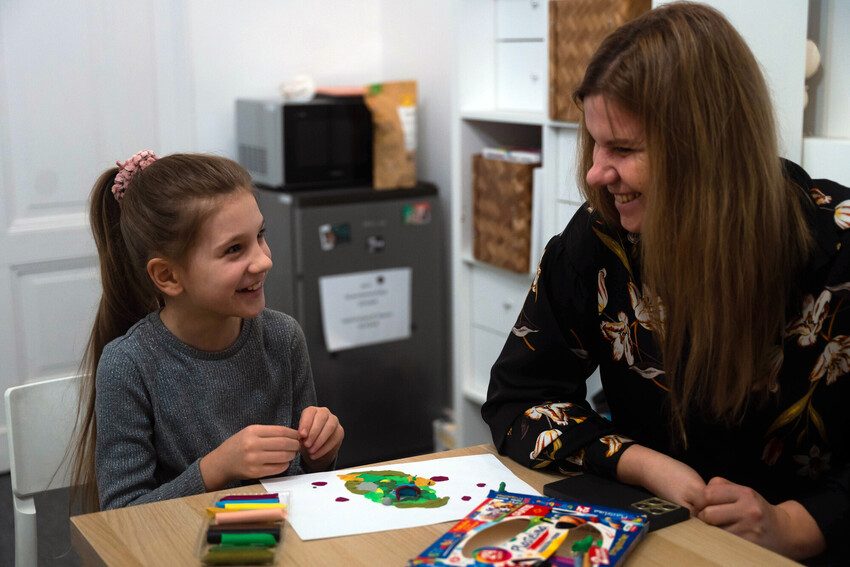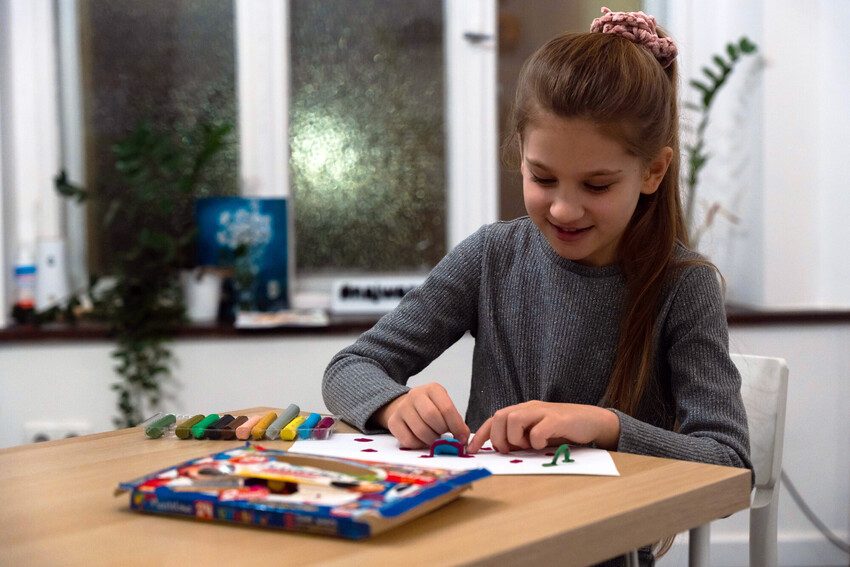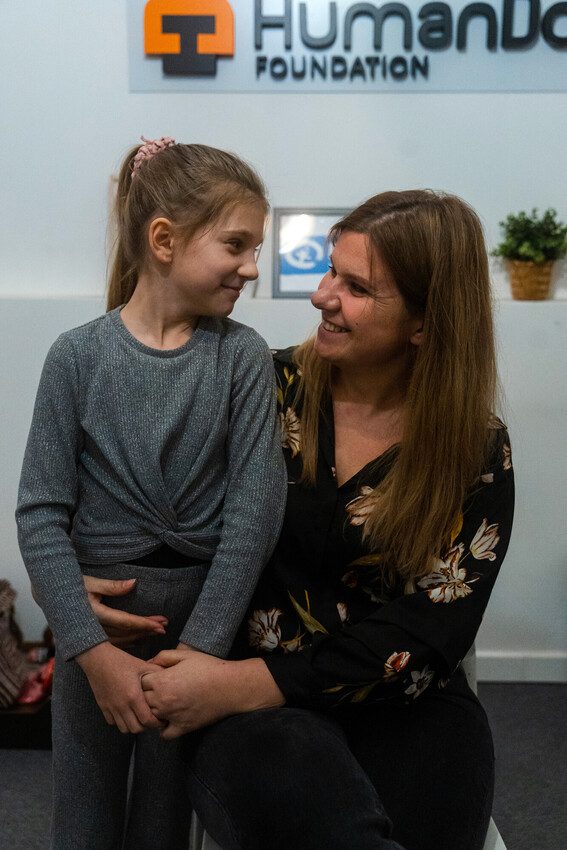The changing support needs of refugees
Halyna came to Poland from Ukraine 3 years ago. She worked as an integration centre educator and now teaches at a Polish school. Halyna shares her views and experience on the importance of integration centres, and the changing educational, psychosocial and life building support needs of children and adults in Poland with refugee experience.

Halyna, 36, and her daughter Zlata, 9, came to Poland 3 years ago when the war in Ukraine began. Halyna first found support at an integration centre run by HumanDoc, one of Plan International’s partners in Poland, which provided refugees from Ukraine access to information about school, work, healthcare, housing, etc. to help them build their lives in Poland.
Halyna later joined HumanDoc as an educator and her daughter Zlata took part in many activities at the integration centre, including those led by her mother. The centre closed in November 2024 after the project funding ended. Halyna now teaches in a Polish school.
Halyna shares her experiences and observations from the integration centre and as a teacher.
The benefits of the integration centre
“I found that the children’s art therapy classes have had a very positive effect on my daughter. There are many things I do not tell her about the war, but she still sees and feels my reaction when I read the news, no matter how hard I try to hide it. The art therapy classes help Zlata and other children to express what they are feeling, even if they have not yet found all the words.
“For me a child is a child, there is no difference between them.”
Halyna
“Many mothers, like me, came to Poland with children, often very young, but without a partner. How could they look for a job or even attend a language course if they had no one to look after their children? HumanDoc responded to this need by offering childcare at the same time as the language courses. This allowed the mothers to learn the language as well.
“As part of a joint project between HumanDoc and Plan International, women’s clubs are being held, focusing on the prevention of gender-based violence. But the club also had an additional outcome – it became a place where women with refugee experience could share relevant information about building their lives in Poland – school, work, health care, housing, etc. We could learn from each other how to manage our lives in a new country.
“Participating in and then working in the joint project allowed me to become more open to the changes in my life; to become stronger. I knew I had a strong personality before, but now that I have lost my safe space and had to start all over again, I have realised that I am even stronger.
“When our integration centre closed it felt like a great loss for the project participants and staff. For me, the centre was a piece of Ukraine in Poland. This centre was a great place for newcomers from Ukraine. The staff helped people with translation, went with them to doctors’ appointments, helped people with disabilities, for example, provided transport when needed, gave legal advice and so on.”

Children’s educational struggles
“As a teacher, I recognise the challenges that children from Ukraine have experienced over the years – first the start of COVID, then the war – so there is a need for teachers to recognise this and adapt their approach. Children from Ukraine have faced many educational challenges.
“First, they studied online because of COVID, and this did not always ensure they received a quality education, and then the war started. Many children had to stop their education for a while, many returned to online learning, and those who left Ukraine struggled with a foreign school system. In my work, I try to encourage my fellow teachers to recognise the educational losses of children from Ukraine.
“Teenagers have the hardest time. They often rebel. Many teenagers refused to go to school, many even had problems leaving the house. HumanDoc gave them a chance to get together and work through their difficulties. They could play board games, attend group sessions led by a psychologist, learn how different things work in Poland, take part in educational activities and prepare for exams with the teachers. Their mothers often acknowledged that this helped their children to get out of that state.
“I don’t like it when people say, ‘Polish child’ or ‘Ukrainian child’. For me a child is a child, there is no difference between them.”
“Now, almost 3 years after the war, the needs of people with refugee experience have changed. “
Halyna
What needs to be done

“I think about children and teenagers – no matter where they come from – and their educational needs. Schools and parents often cannot cover everything. That is why places like the integration centre and complementary non-formal education activities are essential everywhere.
“People in Ukraine need a lot of support. And people in Poland, both refugees and host communities, need support.
“Now, almost 3 years after the war, the needs of people with refugee experience have changed. Many have found jobs, but our legal status is always uncertain. Every few months, the government extends the legal stay of Ukrainians who fled the large-scale war, and people can never be sure if the permit will be extended next time. And people can’t apply for a longer stay because their work contracts are usually short term again due to the uncertainty of whether they will be able to stay in Poland in the next 6 months.
“No matter how we Ukrainians try to live our lives normally, we are still just pretending. Most people here have loved ones in the army. I myself have 2 brothers on the front line. When I get a phone call from home, I get very scared if something has happened. Most of us do not know if we will ever get the chance to go home.”
Plan International’s response to the humanitarian crisis in Ukraine
In 2025, an estimated 12.7 million people in Ukraine will require humanitarian assistance, including nearly 2 million children. There are still not enough accessible, affordable, and culturally appropriate services to meet the growing needs of refugees and displaced communities.
Plan International is providing direct life-saving humanitarian assistance, including non-food items, multi-purpose cash, winter kits and recovery support. Plan is working with local partners to strengthen child protection systems by raising awareness and providing information on child protection risks and referral pathways in all 4 countries: Ukraine, Poland, Romania and Moldova.
As well as providing psychosocial support to families, our partners help families with documentation to confirm children’s disability status, finding appropriate educational facilities and arranging rehabilitation services for children who are not yet in school or kindergarten.
Plan’s response includes expanding the availability of mental health and psychosocial support services, protecting girls’ and young people’s sexual and reproductive health and rights, expanding responses to gender-based violence, and ensuring the continuation of quality formal and alternative education and learning.
Through our humanitarian response, Plan International’s Ukraine Response has reached nearly 900,000 people, including 320,000 people with emergency humanitarian assistance with a gender-responsive and transformative approach at its core. Of these, 193,000 are girls and 158,000 are boys.
Categories: Emergencies


